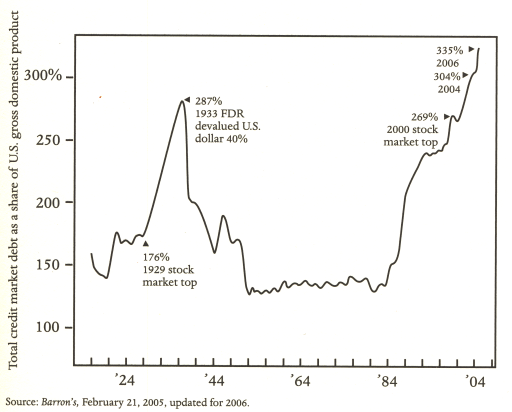 Graph of Income Inequality
Graph of Income Inequality
My current thoughts... stop spending beyond your means, citizen and government!!! In the words of Rick Santelli... "Stop spending! Stop spending! Stop spending!"
Articles
De-leveraging...It's All About the Debt
How bad is it going to be? Well, just keep your eye on that total debt versus GDP number. It usually runs around 150%, and at present it's at 350%. The fact is, most of the assets which secure that debt are themselves inflated by the bubble, to the extent that nobody knows what they're really worth. But if you imagine the debt bubble deflating to its historical value, then you're looking at a fall of more than 50% in asset values blown up in the bubble... And because the market for debt-based securities is global, the excesses of the U.S. credit market will afflict financial institutions worldwide.
At the root of every financial bubble is leverage: ...debt.
Article 8: The Stinking Rich and the Great Divergence
Who are the Stinking Rich? Their average annual income is about $7 million. Most of them likely work in finance, a sector of the U.S. economy that saw its share of corporate profits rise from less than 10 percent in 1979 to more than 40 percent in the aughts... An explanation of how finance came to take over the U.S. economy would require its own Slate series. But Saez, Hacker, and Pierson argue plausibly that the industry's deregulation (and the protection it received from a few well-placed Democrats like Sen. Chuck Schumer of New York) played a large role.
Two Very important articles in one PDF
This post began as an evaluation of the importance of uncertainty in the marketplace... to touch on this subject (which will probably be taken up in a future blog post) is the article, "Uncertainty bedevils the best system". That is the article that led me to this PDF.
...but the article above it better relates to today's topic and is a great evaluation of the issues. "Cutting back financial capitalism is America's big test". (A common qualm of mine, I hate the title... I think it is abuse of the word "capitalism"... but maybe not. This may have been an irresponsible practice of capitalism.)




No comments:
Post a Comment